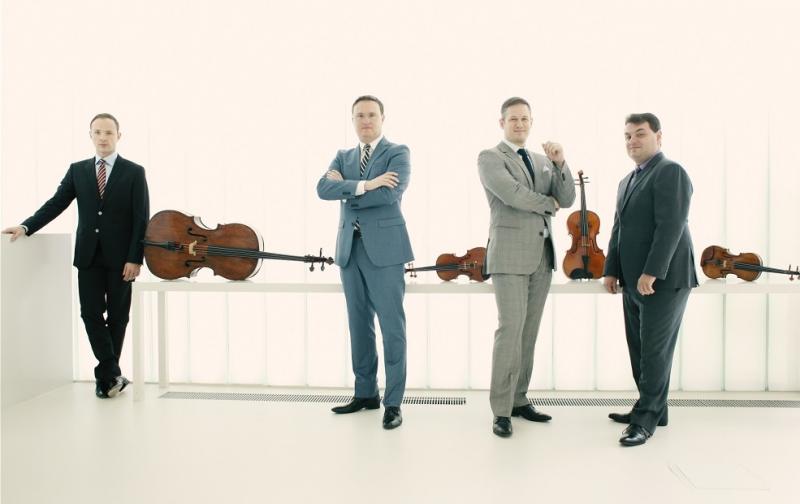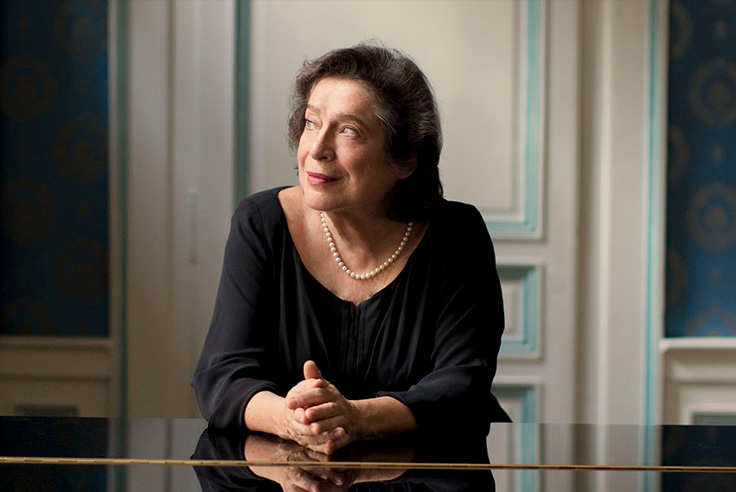Jerusalem Quartet, Leonskaja, Wigmore Hall review - freedom and rigour in perfect balance | reviews, news & interviews
Jerusalem Quartet, Leonskaja, Wigmore Hall review - freedom and rigour in perfect balance
Jerusalem Quartet, Leonskaja, Wigmore Hall review - freedom and rigour in perfect balance
Arguably the world’s best quartet and pianist join forces in Shostakovich

It’s not often that the most bittersweet moment in a rich concert comes in the encore. Elisabeth Leonskaja had already played the generous extra in question, the Dumka movement of Dvořák’s A major Piano Quintet, with the Staatskapelle Quartet only a fortnight earlier. Here, fine-tuned with the Jerusalems, that moment when the joyfully flowing episode turns dark and the piano seems to call from a dark wood proved sheer magic.
There wasn’t a moment in this concert where anyone in the audience could (or should) have lost concentration, The Jerusalems’ art is flexible, almost improvisatory in feel, quivering, shining, not unlike the Borodin Quartet’s then-unique qualities in its heyday. It owes a lot to the committed underpinning, verging on genius, of cellist Kiril Zlotnikov, placed not to the right but directly facing the audience, and the seemingly free soaring of first violinist Alexander Pavlovsky, but the golden sound also extends to the second, Sergei Bresler, and viola-player Ori Kam, whose joyous singing at the start of Dvořák’s “American” Quartet was also golden.
At a casual glance the programme seemed a bit too on the crowd-pleasing side – Shostakovich’s Piano Quintet, after all, is surely his most direct and at times simple chamber work, a masterpiece all the same, and this isn't the first time Leonskaja (pictured below) and the Jerusalems have played it at the Wigmore – but that was to reckon without the serious intent in Haydn’s F minor Quartet, Op. 20 No. 5, the intensity of its opening movement matched by the brief but profound two-voice fugue in the finale. Nor was the Dvořák pure sunshine; the Jerusalems’ febrile approach may not be exactly Bohemian – the native strains here are hard to distinguish from the American aspect – and the constant vibrato was a matter of choice and taste, but again everything shimmered and delighted.  Cannily, Shostakovich wrote a piano role for himself which has maximum impact through relatively simple means. The octaves crowned by ringing bell sounds and the powerful bass had stunning impact in Leonskaja’s sound – so physically strong from a pianist in her late 70s – while the sheer concentration on another, this time more sustained Fugue, starting with focused non vibrato from Pavlovsky, contrasted with the ambiguous but still thrilling high jinks of the scherzo.
Cannily, Shostakovich wrote a piano role for himself which has maximum impact through relatively simple means. The octaves crowned by ringing bell sounds and the powerful bass had stunning impact in Leonskaja’s sound – so physically strong from a pianist in her late 70s – while the sheer concentration on another, this time more sustained Fugue, starting with focused non vibrato from Pavlovsky, contrasted with the ambiguous but still thrilling high jinks of the scherzo.
The finale, too, is simple only on the surface; to achieve that unbearable lightness of being in the final bars takes supreme mastery, and that was there at every point last night. Here's a hope for a future visit, though: the Jerusalems’ two violinists are Ukrainian born – Zlotnikov is from Belarus, Kam was born in America – and while the Shostakovich gave us full scope to mourn and meditate on the horrors of the past year in Ukraine (and Israel), there are some fine quartets by Ukrainian composer Lyatoshinsky: could they include at least one in a forthcoming programme?
rating
Share this article
The future of Arts Journalism
You can stop theartsdesk.com closing!
We urgently need financing to survive. Our fundraising drive has thus far raised £49,000 but we need to reach £100,000 or we will be forced to close. Please contribute here: https://gofund.me/c3f6033d
And if you can forward this information to anyone who might assist, we’d be grateful.

Subscribe to theartsdesk.com
Thank you for continuing to read our work on theartsdesk.com. For unlimited access to every article in its entirety, including our archive of more than 15,000 pieces, we're asking for £5 per month or £40 per year. We feel it's a very good deal, and hope you do too.
To take a subscription now simply click here.
And if you're looking for that extra gift for a friend or family member, why not treat them to a theartsdesk.com gift subscription?
more Classical music
 Classical CDs: Dungeons, microtones and psychic distress
This year's big anniversary celebrated with a pair of boxes, plus clarinets, pianos and sacred music
Classical CDs: Dungeons, microtones and psychic distress
This year's big anniversary celebrated with a pair of boxes, plus clarinets, pianos and sacred music
 BBC Proms: Liu, Philharmonia, Rouvali review - fine-tuned Tchaikovsky epic
Sounds perfectly finessed in a colourful cornucopia
BBC Proms: Liu, Philharmonia, Rouvali review - fine-tuned Tchaikovsky epic
Sounds perfectly finessed in a colourful cornucopia
 BBC Proms: Suor Angelica, LSO, Pappano review - earthly passion, heavenly grief
A Sister to remember blesses Puccini's convent tragedy
BBC Proms: Suor Angelica, LSO, Pappano review - earthly passion, heavenly grief
A Sister to remember blesses Puccini's convent tragedy
 BBC Proms: A Mass of Life, BBCSO, Elder review - a subtle guide to Delius's Nietzschean masterpiece
Mark Elder held back from blasting the audience with a wall of sound
BBC Proms: A Mass of Life, BBCSO, Elder review - a subtle guide to Delius's Nietzschean masterpiece
Mark Elder held back from blasting the audience with a wall of sound
 BBC Proms: Le Concert Spirituel, Niquet review - super-sized polyphonic rarities
Monumental works don't quite make for monumental sounds in the Royal Albert Hall
BBC Proms: Le Concert Spirituel, Niquet review - super-sized polyphonic rarities
Monumental works don't quite make for monumental sounds in the Royal Albert Hall
 Frang, Romaniw, Liverman, LSO, Pappano, Edinburgh International Festival 2025 review - sunlight, salt spray, Sea Symphony
Full force of the midday sea in the Usher Hall, thanks to the best captain at the helm
Frang, Romaniw, Liverman, LSO, Pappano, Edinburgh International Festival 2025 review - sunlight, salt spray, Sea Symphony
Full force of the midday sea in the Usher Hall, thanks to the best captain at the helm
 Elschenbroich, Grynyuk / Fibonacci Quartet, Edinburgh International Festival 2025 review - mahogany Brahms and explosive Janáček
String partnerships demonstrate brilliant listening as well as first rate playing
Elschenbroich, Grynyuk / Fibonacci Quartet, Edinburgh International Festival 2025 review - mahogany Brahms and explosive Janáček
String partnerships demonstrate brilliant listening as well as first rate playing
 BBC Proms: Akhmetshina, LPO, Gardner review - liquid luxuries
First-class service on an ocean-going programme
BBC Proms: Akhmetshina, LPO, Gardner review - liquid luxuries
First-class service on an ocean-going programme
 Budapest Festival Orchestra, Iván Fischer, Edinburgh International Festival 2025 review - mania and menuets
The Hungarians bring dance music to Edinburgh, but Fischer’s pastiche falls flat
Budapest Festival Orchestra, Iván Fischer, Edinburgh International Festival 2025 review - mania and menuets
The Hungarians bring dance music to Edinburgh, but Fischer’s pastiche falls flat
 Classical CDs: Hamlet, harps and haiku
Epic romantic symphonies, unaccompanied choral music and a bold string quartet's response to rising sea levels
Classical CDs: Hamlet, harps and haiku
Epic romantic symphonies, unaccompanied choral music and a bold string quartet's response to rising sea levels
 Kolesnikov, Tsoy / Liu, NCPA Orchestra, Chung, Edinburgh International Festival 2025 review - transfigured playing and heavenly desire
Three star pianists work wonders, and an orchestra dazzles, at least on the surface
Kolesnikov, Tsoy / Liu, NCPA Orchestra, Chung, Edinburgh International Festival 2025 review - transfigured playing and heavenly desire
Three star pianists work wonders, and an orchestra dazzles, at least on the surface

Add comment